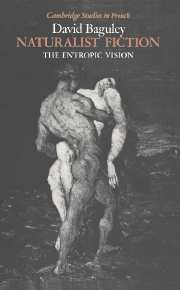Book contents
- Frontmatter
- Contents
- Acknowledgments
- Introduction
- 1 Histories
- 2 Theories: realism, naturalism, genre
- 3 The founding texts
- 4 The tragic model
- 5 Comic strains
- 6 In the ironic modes: naturalist satire and parody
- 7 The ‘scandal’ of naturalism
- 8 Naturalist description
- 9 The entropic vision
- 10 By way of conclusion: two English examples
- Notes
- Translations of passages in French
- Select bibliography
- Index
- Cambridge Studies in French
- Frontmatter
- Contents
- Acknowledgments
- Introduction
- 1 Histories
- 2 Theories: realism, naturalism, genre
- 3 The founding texts
- 4 The tragic model
- 5 Comic strains
- 6 In the ironic modes: naturalist satire and parody
- 7 The ‘scandal’ of naturalism
- 8 Naturalist description
- 9 The entropic vision
- 10 By way of conclusion: two English examples
- Notes
- Translations of passages in French
- Select bibliography
- Index
- Cambridge Studies in French
Summary
A brief preamble on the genesis of this book will perhaps not seem out of place in a study of a type of literature much concerned with origins and frequently intent upon defining its originality in relation to other literary models. The book was conceived, some considerable time ago, as an introductory study to the French naturalist movement for (mainly) English-speaking readers. Had that project come to fruition, it would undoubtedly have followed a most predictable plan. There would have been the requisite initial chapter on usages of the term ‘naturalism’ in philosophy, in art criticism and in literary aesthetics, followed, no doubt, by a study of positivist and scientific thought in mid-nineteenth-century France, then by a summary of the main ideas of Hippolyte Taine, all of which supposedly provided an impetus to the movement. There would have been sections on the literary precursors of the naturalist writers, ‘realists’ like Balzac, Duranty, the Goncourt brothers, on Zola's early works and aesthetic principles, on the formation of the so-called ‘Médan group’ (officially Paul Alexis, Henry Céard, Léon Hennique, Joris-Karl Huysmans and Guy de Maupassant) with mention of the celebratory dinner offered by the five above (plus Octave Mirbeau) to their elders, Flaubert, Edmond de Goncourt and Zola (plus the publisher Charpentier), at the restaurant Trapp on 16 April 1877, an occasion usually considered to have been the founding event of the naturalist school in France.
- Type
- Chapter
- Information
- Naturalist FictionThe Entropic Vision, pp. 1 - 9Publisher: Cambridge University PressPrint publication year: 1990



